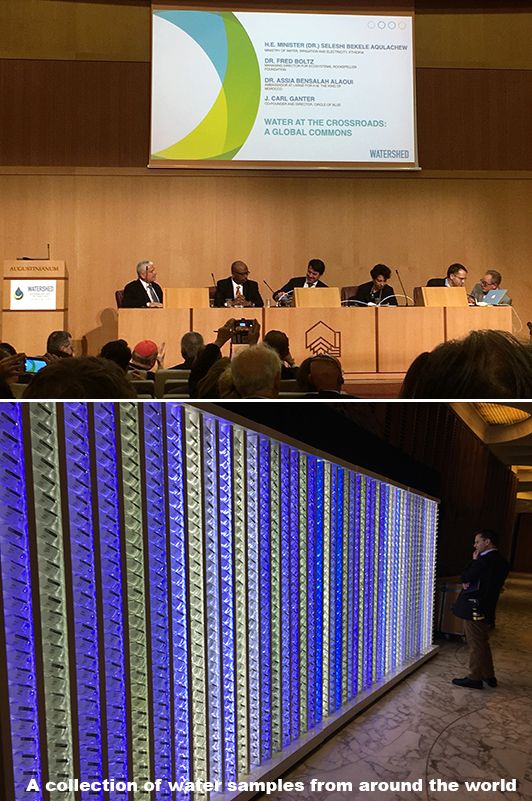

Preparing Young People to Address Global Challenges
Source/Author: Adrianne Finley Odell, Assistant Head of School
March 31, 2017
With a recognition that over the past 10 years conferences organized to bring focus to the global water crisis have only generated incremental results, a group of global leaders who are working to address the crisis gathered at the Vatican last week on World Water Day (March 22nd) and the two days surrounding it to address the challenge collaboratively and with a commitment to work together in the years ahead.
I had the good fortune to join “Watershed” as an educational ambassador for one of the organizers of the event, the non-profit organization Circle of Blue. This, quite frankly, was my first “water conference” so I had very little idea of what to expect. I left encouraged that leaders from the World Bank, World Economic Forum, the Vatican, United Nations, various non-governmental organizations, and a variety of representatives from various countries were committed to address the issue and wanted to engage young people in the conversation and listen to their voices.
Recognizing that it will be the youth of today who will be the ones to lead us through this challenge in the years ahead, there was a shared understanding that education is absolutely critical and must start very early.
Recognizing that it will be the youth of today who will be the ones to lead us through this challenge in the years ahead, there was a shared understanding that education is absolutely critical and must start very early.
Dr. Ian Goldin from Oxford University, and previously an advisor to Nelson Mandela and chief economist for the European Bank for Reconstruction and Development, spoke at the Watershed conference that was streamed live through Facebook. He said that the only certainty is uncertainty, but it is optimism that unites us. With exponential GDP and population growth globally over the last ten years, we are experiencing a time much like Rome experienced during the Renaissance. He stated, “today is the slowest day you’ll know for the rest of your life.” And while walls have gone down between societies, they have gone up within societies, resulting in more than simply being connected, but rather being entangled. “We must recognize that our fates are interwoven with each other,” he said.
Kathryn Sullivan, former astronaut and NOAA administrator said, “We must find a way to live that recognizes we are the crew of a spaceship—earth,” and that we need to ensure our young people are provided with educational opportunities to truly understand the challenges we face by giving them experiences to learn. She said, “Human beings don’t change their mind because they’ve heard something new - they change because they’ve experienced something new,” and we need to “make sure students experience something. They must learn in communities across boundaries. There are millions of children looking to us.”
Professor Gunter Pauli, sustainability entrepreneur and author of The Blue Economy encouraged us to look at reality through the eyes of our children. He said that our children need mentors and to be inspired. “I don’t want to teach kids anything, I want to inspire them. Kids need inspiration.”
And Dr. Fred Boltz from the Rockefeller Foundation said that we shouldn’t “be satisfied with 20th century solutions to 21st century problems.” He acknowledged that we have some of the most daunting challenges ever and said that we need to look to young people and give them a voice in addressing these challenges. “The youth have the answers – the greatest chance for solving these problems.”
Other presenters at the conference talked about the nexus of water, food and energy and how they are all related. It is estimated that by 2050, with a 9 billion population worldwide, there will be a global water gap of 55%, global food gap of 60%, and global energy gap of 80%—with 30% of the world’s energy consumed by the food sector and 80% of the world’s freshwater being utilized by agriculture. To put this in perspective, if we do not have a significant change of course, this year’s high school graduates will be faced with such a reality by the time they are fifty years old.
These are staggering gaps between the need for water and food and its availability worldwide in the years to come. A far greater gap, however, exists between the perception of the challenge and the reality of it. For those of us that have access to clean and safe water, it is hard to imagine the severe nature of this crisis for our world. Most of us can simply turn on a faucet to access water in abundance, while individuals in other parts of the world spend substantial parts of their day traveling to and from sources of water to gather it in containers to take back to their homes. In an effort to gain a better understanding of people’s relationship with water—their values around water and how they “value” water—leading up to World Water Day, there was a social media campaign to engage people in the dialogue to share their stories of what water means to them. Fourth grade students from Mrs. Oman’s class were among people from around the world who participated in sharing their stories through video on the website for the Watershed conference http://worldwatervalues.org/stories/ .
IBM Watson monitored these submissions along with Internet searches and global Internet traffic related to water in an effort to leverage the power of artificial intelligence to gain a better understanding of how people from around the world value water, both monetarily and in terms of their personal values. A synthesis of this work was shared with attendees at the water conference and will continue to be analyzed in the weeks ahead.
On the day after World Water Day, conversations continued in strategic planning mode to set a course for moving forward over the next five years. The group agreed on the following seven broad imperatives to address the problem holistically:
- Communication
- Governance
- Water Security & Safety
- Organizational Collaboration
- Funding Utilization
- Education
- Resource Management
The group gathered at the Vatican for World Water Day was a small but committed group. It is a first step to enhance communication and shared action on a path forward. There was a recognition that there are 20,000 organizations around the world working on the issue of water in some way. Why so many? Because the problem is so huge and pervasive. But if there are that many organizations, how many people worldwide are focused on this issue? And why is there still such a disconnect between perception and reality regarding the world’s water crisis? Why is there not progress in a more substantial way? There are very real obstacles that have hindered progress, from lack of a shared mandate, fiscal resources to address the problems, and a lack of integrated efforts and big picture thinking. The group identified these and other obstacles to each imperative as well as action steps for the next few years.
One of the bright spots, however, was the clear focus on youth—and during our workshop the group received word from Vatican leadership that it is prepared to commit resources to education regarding the global crisis through its vast reach to thousands of PK-12 Catholic schools as well as universities worldwide.
One of the bright spots, however, was the clear focus on youth—and during our workshop the group received word from Vatican leadership that it is prepared to commit resources to education regarding the global crisis through its vast reach to thousands of PK-12 Catholic schools as well as universities worldwide.
During his general audience on World Water Day, Pope Francis recognized those in attendance for Watershed, “I am happy that this meeting is taking place, for it represents yet another stage in the joint commitment of various institutions to raising consciousness about the need to protect water as a treasure belonging to everyone...I especially encourage your efforts in the area of education, through programmes directed to children and young people.”
Our young people are fully capable. They need a seat at the table and they want to be at the head of the table because they recognize that if we don’t shift course soon, their future is at stake. As we think about how best to prepare our young people to lead and take their seat at the table, our commitment to an educational philosophy and program that prioritizes critical thinking and real-world problem solving, collaboration, communication, creativity and entrepreneurial spirit, leadership, cultural literacy, and technological literacy is all the more relevant. These skills along with the values of integrity, respect, responsibility, knowledge and compassion enable our young people to better address the global issues that have become increasingly critical for our future.
View fourth grade water stories:
























